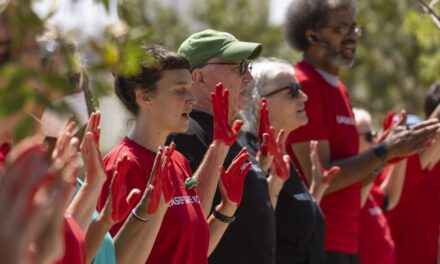By Alex Ward, VOX
Marwan Tahtah/Getty Images
As Lebanon recovers from a deadly explosion in its capital city, Beirut, much of the country has a serious request for the world: Please, whatever you do, don’t give aid money to our government.
The reason is few trust Lebanon’s leaders to use such funds wisely. They mismanaged the economy for decades with a Ponzi-like scheme that whisked away the hard-earned money of Lebanese people from banks to keep the government afloat and line the pockets of those in charge. The troubled policy screeched to a halt after the country’s banks simply ran out of cash last year, meaning Lebanese workers lost savings they’d stored in accounts and expected to be available when needed.
The blast — which killed nearly 140 people, left thousands wounded, displaced over a quarter of a million people, and decimated Beirut’s once-bustling streets — deepened an economic crisis the government created.
And few want to give Lebanon’s top officials the opportunity for a repeat performance.
That was evident during French President Emmanuel Macron’s visit to Beirut on Thursday. As he offered words of condolence and support, some pleaded he keep Lebanon’s government out of any recovery efforts.
“We hope this aid will go to the Lebanese people, not the corrupt leaders,” one man told the French leader, Reuters reported. But some want Macron to go further than that: Almost 52,000 people signed a petition calling on France to take control of Lebanon for the next 10 years.
“Lebanon’s officials have clearly shown a total inability to secure and manage the country,” the petition reads. “We believe Lebanon should go back under the French mandate in order to establish a clean and durable governance,” referring to the European nation’s control of the Middle Eastern country from 1920 to 1945.
Meanwhile, people are taking to social media to share links to aid organizations that locals say need more resources help to better provide care for explosion victims.
It seems many countries are abiding by the general request to avoid the government. For example, Australia pledged $1.4 million to the United Nations’ World Food Program and the Lebanese Red Cross, and others, like France, Germany, and Russia, are sending search-and-rescue and medical teams to assist civil society groups.
Experts I spoke to said all of this is a good start, and may put Lebanon on a stronger path toward recovery. But they also warn that much, much more needs to be done.
What Lebanon must do now
Regional experts and humanitarian workers I interviewed were clear Lebanon’s recovery has both a humanitarian and a political aspect. Without addressing both, the country will fail to bounce back from the blast.
Let’s start with the humanitarian bit, as it’s the most pressing.
Bujar Hoxha, the Lebanon country director for the aid group CARE, told me “the top priority is to find missing persons.” Search-and-rescue workers say it’s still possible to find living missing persons even 72 hours after an incident like this, so there’s hope more will be rescued in the coming day or two.
Beyond that, though, CARE and other humanitarian groups in Beirut have identified four key needs.
Food
About 80 percent of Lebanon’s imports came in through Beirut, and the port in Tripoli, which brought in the other 20 percent, can’t scale up. Some nourishment can come in via cargo planes, but that will increase the prices of the goods. The country’s economic crisis has already made most food items expensive for the everyday Lebanese person to buy, so the need to alleviate mass hunger is immediate.
It doesn’t help that the explosion also took out all but a month’s worth of grain stores.
Medical care
Beirut’s hospitals are already overrun with those wounded in the blast, while others sustained so much damage they can’t safely treat patients. People seeking professional medical attention, whether for explosion-related injuries or coronavirus symptoms, are being turned away in droves. “The situation is a disaster,” Pamela Makhoul, a nurse at St. George Hospital in Beirut, told CBS News on Wednesday. “There’s nothing left.”
It’s why Hoxha said aid groups in the capital are working overtime to set up field hospitals and bring in needed medicines and disinfectants to treat patients.
Shelter
About 300,000 people have been displaced and now live without basic accommodations. Local groups are working to set up tents and other makeshift homes to keep the affected out of the elements and families together.
Mental health support
Lebanon was already in the midst of multiple crises: an economic one, a public health one amid the pandemic, and a political one. The blast has compounded the hardship, and many will need help to cope with it all. “These people were already facing immense trauma, but this adds more fuel to what they were feeling,” said Hoxha. “I don’t know how much more they can take.”
As those herculean efforts proceed, political aspects of the recovery will still be important. Randa Slim, a Lebanese American expert at the Middle East Institute, has two main suggestions for how they should be handled.
From the start, an international committee of Lebanese and international experts should investigate how 2,700 tons of ammonium nitrate — the suspected fuel for the explosion — could have been stored at such a vital port for six years. Normally, government officials would undertake such a probe, but that’s just not an option in this case.
“There is no trust whatsoever in the Lebanese government to get to the truth,” Slim told me. Not only did the government leave the materials there, but decades of corruption have also eroded the public’s faith in what the government says.
The other part includes forming a committee — which could include some trusted Lebanese officials and foreign leaders — to oversee how reconstruction money will be spent in Beirut. This is vital, Slim warned, because after Lebanon’s civil war from 1975 to 1990, the country’s leaders pocketed funds meant to rebuild the nation. Without transparency, she added, Lebanese people will expect history to repeat itself.
Others have suggested similar ideas. Rami Khouri, a senior public policy fellow and journalism professor at the American University of Beirut, outlined a proposal in which humanitarian aid would be “overseen by a newly created consortium comprising a few credible and efficient government officials, proven non-governmental organizations and humanitarian foundations, a few credible international aid agencies, and some individuals with respected professional expertise.”
France, Slim suggested, may want to take the lead on international aid efforts, since it’s clear the country remains respected by many (though certainly not all) in Lebanon. “There is more trust in France among many Lebanese than in the Lebanese government,” she told me.
There are, of course, a few problems with these proposals, Slim admits. Namely, Lebanon’s government would have to agree to cede some of its sovereignty to foreign officials, and a government led by Hezbollah — a Shia Muslim party and militant group with close ties to Iran that the US considers a terrorist organization — likely won’t want other countries taking a deep look into its operations.
What’s more, every country in the world is focused on their local Covid-19 outbreaks and other problems. Foreign leaders therefore may not have the political space or resources with which to offer long-term help to Lebanon.
But, based on the assistance Lebanon clearly needs, it would be a mistake not to provide the most effective assistance wherever and whenever possible.
“It’s important to continue to support Lebanon and its civil society,” said CARE’s Hoxha.
:format(webp)/cdn.vox-cdn.com/uploads/chorus_image/image/67167459/1227936876.jpg.0.jpg)













